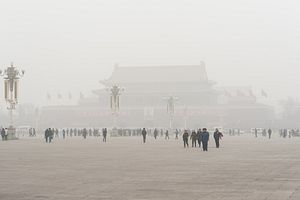For decades, environmental activists have complained that China’s government prioritized economic growth over all else, opting for profit over environmental protection. As a result, China’s polluted air, water, and soil consistently pop up in headlines around the world — not exactly the sort of media attention Beijing would like. Increasing global and domestic scrutiny is motivating Beijing to jump-start its environmental protection efforts. And it turns out that one of the most effective tools in fighting pollution could be the same thing that caused the problem in the first place: profit motive.
China’s government has its eye on economic tools as a new weapon against pollution. Zhai Qing, the Vice Minister of Environmental Protection, recently told reporters that the government plans to use “pricing, taxation, and investment” to encourage more responsible environmental attitudes. In fact, of the 22 new anti-pollution policies submitted for approval to the State Council, Zhai said that ten were economic-focused, with additional measures also targeting the financial sector.
Economic tools have been underutilized to date in China’s environmental protection efforts. Environmental advocates have complained, for example, about the artificially low cost of natural resources such as water and fuel. Simply raising the price of these resources can be an effective way of encouraging conservation — the “pricing” aspect Zhai mentioned in his remarks. The National Development and Reform Commission has already announced a new tiered-pricing system for water, wherein the top 5 percent of water consumers will pay triple the base rate for their water. Similar increases in the price of electricity and fuel may also be in the works.
As a complement to raising base prices, China could also raise taxes on certain resources. The ‘holy grail’ of such taxes, a high fuel tax, is still a remote possibility, but at least one analyst believes it is coming in the future. Xia Guang, the head of China’s Policy Research Center for Environment and Economy (which is affiliated with the MEP), told China Daily that “a fuel tax and traffic congestion fee are likely to be adopted in the future.” In particular, as part of its move away from an over-reliance on coal use, China’s government plans to reform the coal tax. Similar to a price hike, the idea is that higher taxes on coal and other fuel sources will encourage conservation and increased efficiency.
The final part of China’s economic toolbox, investment, is potentially the most powerful. Last year, Zhai Qing said, the MEP vetoed over 30 projects deemed to be too harmful to the environment. The total value of the projects was estimated at over $19 billion. The MEP has long struggled to gain the power necessary to crack down on polluters, but that is starting to change. In addition to shutting down polluting projects before they begin, the MEP is also expected to raise the level of fines for polluting, which currently are often less expensive than the reforms that would be necessary to meet environmental standards.
Finally, and most ambitiously, China is in the early stages of revamping the way its entire financial sector interacts with environmental protection. Chinadialogue noted earlier this month that China “is the only major economy that has begun to integrate climate constraints into financial regulation.” China has been promoting a new “green finance” concept wherein banks are prohibited from lending money to the worst polluters. Chinese banks are also required to report environmental liabilities associated with their investments to the Chinese Banking and Regulatory Commission, making environmental protection one of the benchmarks used to evaluate banks. While such policies are still experimental, they have the potential to completely change the cost-benefit calculations done by banks, and in turn corporations.
In short, China’s new policies are seeking to make polluting unprofitable. By adjusting prices and raising taxes on resources, and by cutting off investment sources for polluters, China hopes companies will decide to go green — not because it’s ethical, but because it’s cost-effective.

































